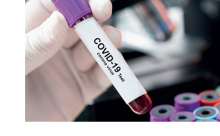
We know that research is needed to tackle the COVID-19 pandemic and that research-active healthcare organisations provide better outcomes for their patients. The Northern Ireland Health Minister Robin Swann and Chief Medical Officer Dr Michael McBride have urged people to get involved in research trials so that we develop the evidence to provide the best possible treatment for our patients. It is therefore important that three research trials for patients with COVID-19, prioritised by the UK’s top doctors, are open and recruiting in Northern Ireland.
These studies are set up and delivered in Health and Social Care (HSC) Trusts and General Practices by the Northern Ireland Clinical Research Network (NICRN). The NICRN is a network of over 100 research trained Health and Social Care (HSC) staff, including nurses, Allied Health Professionals and clinical experts, who work at the interface between the research community, the HSC and patients to provide healthcare organisations with the support and facilities needed to make it easier for research to happen. For over 10 years, NICRN has ensured that the health, wellbeing and prosperity of the Northern Ireland population has benefited from access to high quality clinical research. The NICRN has stepped up to the front line of this pandemic to play a vital role in fighting this new disease by supporting COVID-19 research across the HSC.
A range of potential treatments have been suggested for COVID-19, but being a new illness, nobody knows which of them will turn out to be more effective in helping people recover than the usual standard of hospital care that all patients will receive. The RECOVERY Trial is testing some of these suggested treatments, which include steroids, antibiotics and anti-inflammatory drugs already used for other conditions. Data from the trial are being regularly reviewed so that any effective treatment can be identified quickly and made available to all patients. All HSC Trusts are already recruiting patients to this important study which has already shown that one treatment, low-dose dexamethasone (a steroid treatment), reduces death in hospitalised patients with severe respiratory complications of COVID-19, whereas there was no clinical benefit found from use of hydroxychloroquine in hospitalised patients with COVID-19.
REMAP-CAP is a research study that will include patients in Northern Ireland admitted to an intensive care unit (ICU) with severe Community-Acquired Pneumonia (CAP). The trial is looking at a number of different treatments (such as drugs to reduce the effects of the virus) given at the same time to find out which is the best treatment package for patients to reduce the number of patients dying from COVID-19 as well as treat symptoms in those who are severely ill.
The PRINCIPLE trial is happening with support from GP practices in Northern Ireland. This study aims to stop the disease getting worse so that people with the virus can be treated at home, recover sooner, and avoid the need for hospital assessment and admission. The study aims to recruit 3,000 people across the UK.
As new treatments become available, they can be added to these studies so that a new trial does not need to start each time and helps us to know more quickly which treatments are best for our patients. Given the number of different potential treatments being investigated, extremely large numbers of people are needed to take part. Clinical researchers and scientists still need more participants to generate the scientific evidence required to establish an effective treatment or vaccine. We have excellent research staff and clinical experts in HSC Trusts and GP practices, as part of NICRN and funded by HSC R&D Division.
The NICRN is ensuring that Northern Ireland can play its part in COVID-19 research to find the treatments that work best to help reduce the severity of symptoms and the number of people dying in Northern Ireland and beyond.
To view the complete series of PHA COVID-19 blogs, click here.

